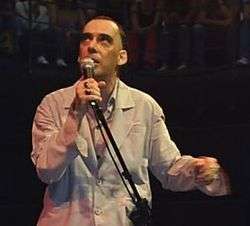Arnaldo Antunes
Arnaldo Antunes (Portuguese pronunciation: [axˈnawdu ɐ̃ˈtunis], born Arnaldo Augusto Nora Antunes Filho, September 2, 1960) is a Brazilian musician, writer, and composer. He was a member of the rock band Titãs, which he co-founded in 1982 and left ten years later. After 1992, he embarked on a solo career. He has published poetry and had his first book published in 1983. He has worked with Marisa Monte, Tribalistas, and Carlinhos Brown.
Arnaldo Antunes | |
|---|---|
 Antunes at the Circo Voador in Rio de Janeiro in 2011 | |
| Background information | |
| Birth name | Arnaldo Augusto Nora Antunes Filho |
| Born | September 2, 1960 São Paulo, São Paulo, Brazil |
| Genres | MPB, rock, Brazilian rock, pop rock, post-punk, punk rock |
| Occupation(s) | Singer, composer, poet, movie producer |
| Instruments | Vocals, guitar, keyboards |
| Years active | 1984–present |
| Associated acts | Aguilar e Banda Performática, Tribalistas, Titãs, Vestidos de Espaço |
| Website | arnaldoantunes |
Childhood
Arnaldo was born on September 2, 1960, to Arnaldo Augusto Nora Antunes and Dora Leme Ferreira. He was the fourth of seven children.[1] In 1967, he enrolled in Luís de Camões school and studied there until 1972. During the following year, he attended PUC SP, where he first got involved with the local art scene. In 1975 he met Paulo Miklos, a classmate at Colégio Equipe. In 1978, he went to study Portuguese and literature at USP.[2]
Career with Titãs
In 1979, Antunes formed his first band, Banda Performática, with his then-wife. In 1982, Titãs do Iê-Iê was formed, with Antunes as a founder. In 1984, they release their self-titled debut album. In 1992, Antunes decided to leave Titãs, after recording seven albums with the band.
Solo career

In 1993 he released his solo debut album Nome, a "multimedia project associating poetry and music", featuring João Donato, Marisa Monte and Arto Lindsay as guest stars, and short computer animation features (produced in collaboration with Celia Catunda, Kiko Mistrorigo and Zaba Moreau). The Nome video was shown in art venues and festivals in Brazil, Italy, Argentina, Australia, Switzerland, Germany, Austria, France, Spain (where it received a Jury recommendation at the Festival International de Video Cidade de Vigo 1995), Netherlands, Monaco, Uruguay, Cuba, Chile, Colombia and the US (receiving an honorable mention at the first annual New York Video Festival).
As a solo artist, Arnaldo Antunes later released Ninguém (1995), O Silêncio (1996), Um Som (1998), Paradeiro (2001) and Saiba (Rosa Celeste/BMG 2004). He also released other albums in special projects, such as O Corpo (1999), a specially produced soundtrack for Grupo Corpo, a dance company from Minas Gerais, and the album Os Tribalistas (EMI/Phonomotor 2002), a collaborative project with Marisa Monte and Carlinhos Brown.
His compositions have been used in the soundtrack of several films, including Blue in the Face, directed by Wayne Wang and Paul Auster; Bicho de Sete Cabeças, directed by Lais Bodanzki; Dois Perdidos Numa Noite Suja, adapted from a novel by Plínio Marcos and directed by José Joffily; and Benjamim, adapted from a novel by Chico Buarque and directed by Monique Gardenberg.
His album A Curva da Cintura, a collaboration with Ira! guitarist Edgard Scandurra and Toumani Diabaté from Mali, achieved a number 5 in the World Music Charts Europe in August 2012.[3]
Personal life
From 1980 to 1987, he was married to Go. Right after they broke up, he married Zaba Moreau, with whom he had four children:[1] Rosa, born in 1988, Celeste, born in 1991, Brás, born in 1997, and Tomé, born in 2001.
Discography
With Titãs
- Titãs (1984)
- Televisão (1985)
- Cabeça Dinossauro (1986)
- Jesus não Tem Dentes no País dos Banguelas (1987)
- Õ Blésq Blom (1989)
- Tudo Ao Mesmo Tempo Agora (1991)
- Titanomaquia (1993, only on "Disneylândia", "Hereditário" and "De Olhos Fechados", as a guest songwriter)
- Domingo (1995, only on "Tudo em Dia", as a guest songwriter)
- Acústico MTV (1997, only on "O Pulso", as a guest singer)
- Volume Dois (1998, only on "Senhora e Senhor" and "Era Uma Vez", as a guest songwriter)
- A Melhor Banda de Todos os Tempos da Última Semana (2001, only on "Cuidado Com Você", as a guest songwriter)
- Como Estão Vocês? (2003, only on "Esperando Atravessar a Rua", as a guest songwriter)
- Paralamas e Titãs Juntos e Ao Vivo (2008, only on "Comida" and "Lugar Nenhum", as a guest singer)
- Sacos Plásticos (2009, only on "Problema", as a guest songwriter)
- Nheengatu (2014, only on "Cadáver Sobre Cadáver", as a guest songwriter)
Solo
- Nome (1993)
- Ninguém (1995)
- O Silêncio (1996)
- Um Som (1998)
- Focus – O Essencial de Arnaldo Antunes (1999)
- O Corpo (2000)
- Paradeiro (2001)
- Saiba (2004)
- Qualquer (2006)
- Ao Vivo em Estúdio (2007)
- Iê Iê Iê (2009)
- Pequeno Cidadão (2009)
- Acústico MTV – Arnaldo Antunes (2012)
- Disco (2013)
- Já é (2016)
Collaborations
- A Curva da Cintura (with Edgard Scandurra and Toumani Diabaté) (2011)
Guest appearances
- Golpe de Estado – Forçando a Barra (1988)
- Theo Werneck – Leite Materno (1990)
- Various artists - Rock de Autor (1991)
- Péricles Cavalcanti – Sobre as Ondas (1995)
- Various artists – O Triângulo Sem Bermudas (1996)
- Edgard Scandurra – Benzina (1996)
- Tom Zé and Zé Miguel Wisnik – Parabelo – Grupo Corpo (1997)
- Tom Zé – Com Defeito de Fabricação (1998)
- Onda Sonora: Red Hot + Lisbon (1998)
- João Donato – Songbook (1999)
- Various artists – Tributo a Cazuza (1999)
- Chico Buarque – Songbook (1999)
- Suba – São Paulo Confessions (2000)
- Zé Miguel Wisnik – São Paulo Rio (2000)
- Marisa Monte – Memórias, Crônicas e Declarações de Amor (2000)
- Walter Franco – Tutano (2001)
- Lula Queiroga – Aboiando a Vaca Mecânica (2001)
- Unknown artist – Só Um é Muito Só (2001)
- Glauco Matoso – Melopéia – Sonetos Musicados (2001)
- Cid Campos – No Lago do Olho (2001)
- Aguilar e Banda Performática – Aguilar e Banda Performática (2001)
- Various artists – Superfantástico – Quando eu Era Pequeno (2002)
- Ortinho – Ilha do Destino (2002)
- João Donato – O Melhor de João Donato (2002)
- Aldo Brizzi – Brizzi do Brasil (2002)
- Various artists – Maysa Esta Chama Que Não Vai Passar (2007)
- Various artists – Pequeno Cidadão (2009)
Bibliography as a writer
- Ou e (visual poem album) (1983)
- Psia (1986)
- Tudos (1990)
- As coisas (1992), Winner of the 1992 Jabuti Awards for Poetry
- 2 ou + Corpos no mesmo Espaço (1997)
- Doble Duplo (selection, translation and art by Ivan Larraguibel), (2000)
- 40 Escritos (organized by João Bandeira) (2000)
- Outro (2001)
- Palavra Desordem (2002)
- ET Eu Tu (2003)
- Antologia (Portugal only) (2006)
- Frases do Tomé aos Três Anos (a collection of illustrations of the first sentences said by his son) (2006)
- Como É que Chama o Nome Disso (2006)
References
- Krepp, Ana; Monica Bergamo (February 9, 2014). "Arnaldo Antunes diz que largou as drogas e não se vende à publicidade". Folha de S.Paulo (in Portuguese). Grupo Folha. Retrieved February 17, 2014.
- "Música com diploma: conheça artistas que fizeram universidade". UOL Música. Grupo Folha. Retrieved May 4, 2013.
- "World Music Charts Europe August 2012". Worldmusic Workshop of the European Broadcasting Union (EBU). August 1, 2012. Retrieved August 1, 2012.